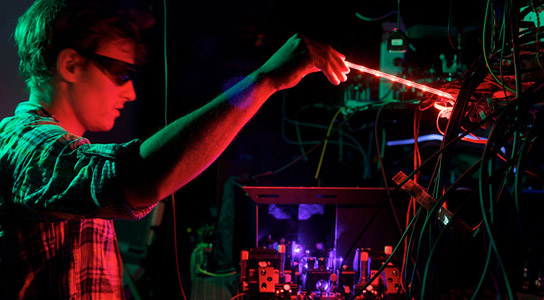
Quantum computers will be able to perform tasks that silicon-based computers wouldn’t be able to do, like cracking the codes that protect bank transactions. Several research teams have revealed solid evidence that quantum physics does embody a level of complexity that classical computers could never match. The new devices these groups have built are much simpler to build than quantum computers but could someday perform some of the same tasks.
The scientists published their findings in the journal Science[1,2] and in pre-prints in arXiv.[3,4] It’s been theorized previously that there are many obstacles to quantum computing, such as the fact that certain quantum particles, like photons, have behaviors that are impossible to predict using ordinary computers.
In the most recent studies, researchers have injected four identical photons into a network of beam splitters on a chip.[1] Thanks to quantum interference, which happens when photons strike a beam splitter simultaneously, the photons take a different path through the optical maze each time the experiment is run. Detectors spot the particles at the end of the run, revealing the probabilities of arriving at all possible destinations.
Without the device that the researchers constructed, calculating these probabilities would be mathematically difficult, yet not impossible. Every added particle doubles the computational difficulty. If 100 photons were put in such a device, the most powerful supercomputer on the planet wouldn’t be able to crunch the numbers.
The experiment could be scaled up to that size, but generating large numbers of identical photons will require getting the timing just right and this won’t be easy. Thankfully other teams are working on similar projects as well. A team in Australia unveiled their own prototype[2] and two more groups, in Austria and Italy, describe similar experiments.[3,4]
These machines are proof of principle, and their construction has only been recently possible thanks to the ability to produce simultaneous batches of identical photons with high reliability.
References:
- “Boson Sampling on a Photonic Chip” by Justin B. Spring, Benjamin J. Metcalf, Peter C. Humphreys, W. Steven Kolthammer, Xian-Min Jin, Marco Barbieri, Animesh Datta, Nicholas Thomas-Peter, Nathan K. Langford, Dmytro Kundys, James C. Gates, Brian J. Smith, Peter G. R. Smith and Ian A. Walmsley, 20 December 2012, Science.
DOI: 10.1126/science.1231692 - “Photonic Boson Sampling in a Tunable Circuit” by Matthew A. Broome, Alessandro Fedrizzi, Saleh Rahimi-Keshari, Justin Dove, Scott Aaronson, Timothy C. Ralph and Andrew G. White, 20 December 2012, Science.
DOI: 10.1126/science.1231440 - “Integrated multimode interferometers with arbitrary designs for photonic boson sampling” by Andrea Crespi, Roberto Osellame, Roberta Ramponi, Daniel J. Brod, Ernesto F. Galvão, Nicolò Spagnolo, Chiara Vitelli, Enrico Maiorino, Paolo Mataloni and Fabio Sciarrino, 26 May 2013, Nature Photonics.
DOI: 10.1038/nphoton.2013.112 - “Experimental boson sampling” by Max Tillmann, Borivoje Dakić, René Heilmann, Stefan Nolte, Alexander Szameit and Philip Walther, 12 May 2013, Nature Photonics.
DOI: 10.1038/nphoton.2013.102